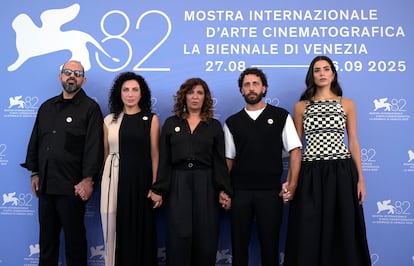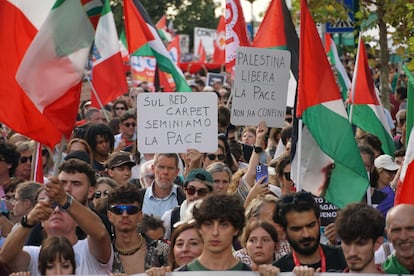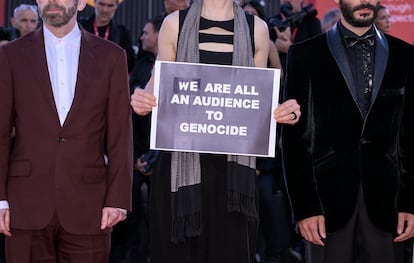The Venice Film Festival is shaken by 'The Voice of Hind', a six-year-old Palestinian girl killed by the Israeli army in 2024.

In a movie, you can imagine anything. Even a highly trained, technologically advanced army shooting a six-year-old girl . In a better world, perhaps, The Voice of Hind, by Tunisian director Kaouther ben Hania, presented today in competition at the Venice Film Festival, would belong in science fiction. However, it is a drama. And real. As real as the telephone conversations the Red Crescent has with the little Palestinian girl to rescue her: the film reproduces the original audio recordings.
January 29, 2024, a gas station in northern Gaza. The car carrying the Hamada family is riddled with bullets by Israeli troops. Only the youngest survives, the one who answers when the emergency services manage to call a cell phone inside the vehicle. A turbulent race against time then begins to save her and, in the meantime, keep her on the phone, reassure her. She says she sees tanks, that it's getting dark, and she's scared. "Come and get me," she pleads again and again. The outcome is already known. Or one can sense it. But her words returned today, at the Mostra , to appeal to everyone. At the end, one of the longest applauses in living memory was heard at a press screening. A film, or a festival, can do little against an Ascii massacre. Hind's voice , at least, denounces what is happening. And it does so through cinematic art. The story is devastating, its adaptation to the screen is powerful. Memorable, in every sense.
Rarely has the reception the film's crew received in the press room been seen: everyone standing. One of the actresses, Saja Kilani, first read a statement: “ Isn't it enough? Mass killings, famine, destruction, occupation. The film doesn't need our defense, it's not an opinion or a fantasy . Her voice is just one of the tens of thousands of children who have been murdered in Gaza. It's the voice of every son and daughter who had the right to live, and to dream, that was stolen from them. […] The key question is: How did we leave a child pleading for her life? Enough.” More applause. They're probably just getting started. It's hard to imagine a winners' list this Saturday, or an awards season, without this film. Brad Pitt, Alfonso Cuarón, Rooney Mara, and Joaquin Phoenix have all signed on as executive producers. Even in Hollywood, the silence is beginning to break. At the press conference, the taboo word "Genocide" was also heard several times regarding what Israel is doing in Palestine. Spanish theaters will be able to form their own opinion starting February 6.

“Films bring empathy, allowing us to understand and see the world, in this case from the Palestinian perspective. When I heard Hind's voice for the first time, it generated a strong desire, rage, and helplessness. The deaths in Gaza are called 'collateral damage,' it's dehumanizing, and it's important that cinema gives these people a voice and a face,” Ben Hania noted. The actors emphasized that they didn't even experience it as a film: it was “a duty,” an “urgency,” which they tried to complete as quickly as possible, in a year and a half. Nor do they consider themselves acting. Rather, they say they reacted as any human would upon hearing those audio recordings. One of them, Motaz Malhees, even had two panic attacks during filming: “I'm Palestinian; I experienced it as a child. It took me back to my childhood, where I felt a thousand times that I would die. I was lucky, and I'm here.”
Ben Hania had already tackled another real, and very relevant, tragedy: in The Four Daughters , which was nominated for an Oscar , she narrated the fundamentalist radicalization of two young women that tore a family apart from within. Two sisters enrolled with the Islamic State, the other two at home with their mother, trying to understand that absence. However, the form invalidated such content: she seemed to care more about the interplay between truth and fiction, or the aesthetics of the shots, than the narrative. Hence, The Voice of Hind set off alarm bells: ruining a story like that would be as easy as it was unforgivable . However, the filmmaker seems to have learned her lesson. Or changed her approach. She doesn't allow herself any artifice, she exercises all possible restraint. The real case already has enough.

The camera never moves from one room: the Red Crescent emergency management room. The horror is only audible. And it's reflected in the faces of those who are scrambling to avoid it. Thus, the film also shows the extreme conditions and challenges the rescuers face . The car where Hind Rajab is hiding is only eight minutes away, according to the navigator. However, endless bureaucratic procedures stand in the way of finding an ambulance, notifying the Palestinian Ministry of Health and the Israeli army, and ensuring its safe passage to the girl. Meanwhile, a worker uses a marker to write the time they're wasting on the wall of the coordinator's office. One hour, two, three. But the person in charge has his reasons: it's up to him to ensure that the operation to save one life doesn't also end with the lives of the two rescuers.
After all, more than 62,000 have been cut short in Palestine since October 2023, according to figures from the Hamas-run Gaza Ministry of Health. Meanwhile, the healthcare system is on the verge of collapse, according to the World Health Organization; and the Integrated Food Security Phase Classification, an international system supported by the United Nations, has officially declared a famine in Gaza City . Israeli troops are heading there these days for the new ground operation launched by the Netanyahu government. Meanwhile, something is moving, not only in the cinema: Belgium has joined the list of countries that will recognize Palestine, as has France, whose president, Emmanuel Macron, has just been reprimanded by the Israeli government for calling his plan for Gaza "an unprecedented disaster."

All of this has been talked about since the very beginning of the Mostra. Or even before. The festival opened with controversy: the Venice for Palestine movement, made up of renowned Italian and international artists, asked the festival for a clearer condemnation of Israel. Artistic director Alberto Barbera replied that they deal with culture , not politics, and in any case their position was clear: that's why they had chosen The Voice of Hind in the competition. When he mentioned it at the festival presentation in July, Barbera had to stop: emotion got the better of him. Last Saturday, the Venice Lido also hosted a pro-Palestine demonstration. And several guest stars have received questions on the issue: among others, Alexander Payne, president of the jury, shied away; Jim Jarmusch, on the other hand, shared his concern.
Ben Hania left only one question unanswered. When asked to respond to those who accuse her of exploiting suffering, she explained that she had nothing to say to them. “On days when I'm really depressed, I wonder what the point of this is, making films... But I think it's important to talk,” the filmmaker added. She talked about the massacre in Palestine, and about Hind Rajab. She was in the butterfly class at her school. She liked the sea and the sand. In an old video, she is seen playing on the beach in Gaza, the one Donald Trump is trying to turn into a riviera.
EL PAÍS





